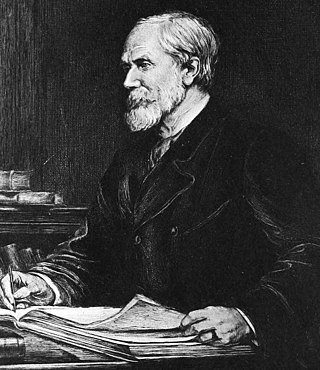
Colonel Sir Henry Yule was a Scottish Orientalist and geographer. He published many travel books, including translations of the work of Marco Polo and Mirabilia by the 14th-century Dominican Friar Jordanus. He was also the compiler of a dictionary of Anglo-Indian terms, the Hobson-Jobson, with Arthur Coke Burnell.

Brigadier Ralph Alger Bagnold, OBE, FRS, was an English 20th-century desert explorer, geologist and soldier.

The Society of Antiquaries of London (SAL) is a learned society "charged by its Royal Charter of 1751 with 'the encouragement, advancement and furtherance of the study and knowledge of the antiquities and history of this and other countries'." It is based at Burlington House, Piccadilly, London, and is a registered charity.

The Royal Geographical Society (with the Institute of British Geographers), often shortened to RGS, is a learned society and professional body for geography based in the United Kingdom. Founded in 1830 for the advancement of geographical sciences, the society has 16,000 members, with its work reaching the public through publications, research groups and lectures.

William Martin Conway, 1st Baron Conway of Allington,, known between 1895 and 1931 as Sir Martin Conway, was an English art critic, politician, cartographer and mountaineer, who made expeditions in Europe as well as in South America and Asia.

The Royal Asiatic Society of Great Britain and Ireland, commonly known as the Royal Asiatic Society, was established, according to its royal charter of 11 August 1824, to further "the investigation of subjects connected with and for the encouragement of science, literature and the arts in relation to Asia." From its incorporation the society has been a forum, through lectures, its journal, and other publications, for scholarship relating to Asian culture and society of the highest level. It is the United Kingdom's senior learned society in the field of Asian studies. Fellows of the society are elected regularly and include highly accomplished and notable scholars of Asian studies; they use the post-nominal letters FRAS.
Proceedings of the Royal Society is the main research journal of the Royal Society. The journal began in 1831 and was split into two series in 1905:

Thomas Abel Brimage Spratt was an English vice-admiral, hydrographer, and geologist.

Frederick William Beechey was an English naval officer, artist, explorer, hydrographer and writer.

Sir Robert Hermann Schomburgk was a German-born explorer for Great Britain who carried out geographical, ethnological and botanical studies in South America and the West Indies, and also fulfilled diplomatic missions for the United Kingdom in the Dominican Republic and Thailand.
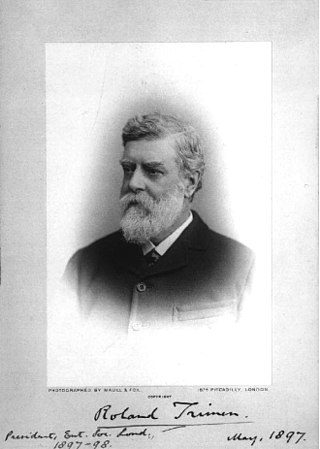
Roland Trimen FRS was a British-South African naturalist, best known for South African Butterflies (1887–89), a collaborative work with Colonel James Henry Bowker. He was among the first entomologists to investigate mimicry and polymorphism in butterflies and their restriction to females. He also collaborated with Charles Darwin to study the pollination of Disa orchids.
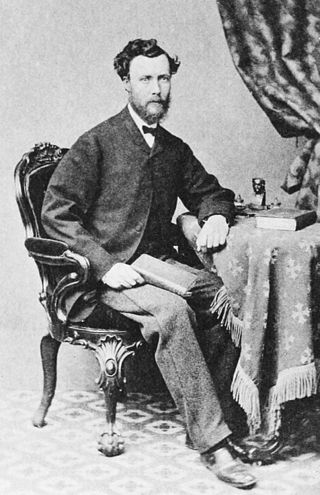
Sir John Kirk was a physician, naturalist, companion to explorer David Livingstone, and a British administrator in Zanzibar, East Africa, where he was instrumental in ending the slave trade in that country, with the aid of his political assistant, Ali bin Saleh bin Nasser Al-Shaibani.
The Journal of the Chemical Society was a scientific journal established by the Chemical Society in 1849 as the Quarterly Journal of the Chemical Society. The first editor was Edmund Ronalds. The journal underwent several renamings, splits, and mergers throughout its history. In 1980, the Chemical Society merged with several other organizations into the Royal Society of Chemistry. The journal's continuity is found in Chemical Communications, Dalton Transactions, Faraday Transactions, and Perkin Transactions, all of which are published by the Royal Society of Chemistry.

Major General Sir Andrew Scott Waugh was a British army officer and Surveyor General of India who worked in the Great Trigonometrical Survey. He served under Sir George Everest and succeeded him in 1843. Waugh established a gridiron system of traverses for covering northern India. Waugh is credited with naming the peak of Mount Everest.
The Proceedings of the Chemical Society was a scientific journal published at various times in the life of the Chemical Society, a scientific society in the United Kingdom that combined with other societies to form the Royal Society of Chemistry in 1980. In 1841, the Society published Memoirs of the Chemical Society, renamed in 1842 to Proceedings of the Chemical Society. Together these were volume 1. Volumes 2 and 3 were published as Memoirs and Proceedings, Chemical Society, London between 1843 and 1848. The Proceedings of the Chemical Society, London were published from vol. 1, 1885 to vol. 30, 1914 and from 1950 to 1964. Between 1915 and 1956 the Proceedings of the Chemical Society, London were published as a supplement to Journal of the Chemical Society, London.

The Garden is the monthly magazine of the British Royal Horticultural Society (RHS), circulated to all the society's members as a benefit of membership; it is also sold to the public.

The Geographical Journal is a quarterly peer-reviewed academic journal of the Royal Geographical Society. It publishes papers covering research on all aspects of geography. It also publishes shorter Commentary papers and Review Essays. Since 2001, The Geographical Journal has been published in collaboration with Wiley-Blackwell. The journal was established in 1831 as the Journal of the Royal Geographical Society of London. Prior to 2000, The Geographical Journal published society news alongside articles and it continues to publish the proceedings of the society's annual general meeting and presidential address in the September issue.
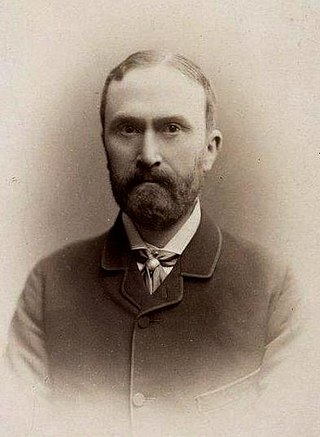
Sir John Scott Keltie was a Scottish geographer, best known for his work with the Royal Geographical Society.
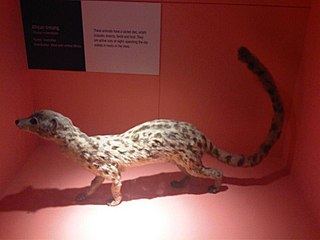
The African linsangs also known as oyans are two species classified in the mammalian subfamily Viverrinae, in the family Viverridae. There is one genus, Poiana.
Proceedings of The Royal Society of Queensland is a multidisciplinary scientific journal published by The Royal Society of Queensland. It was established in 1884.
















